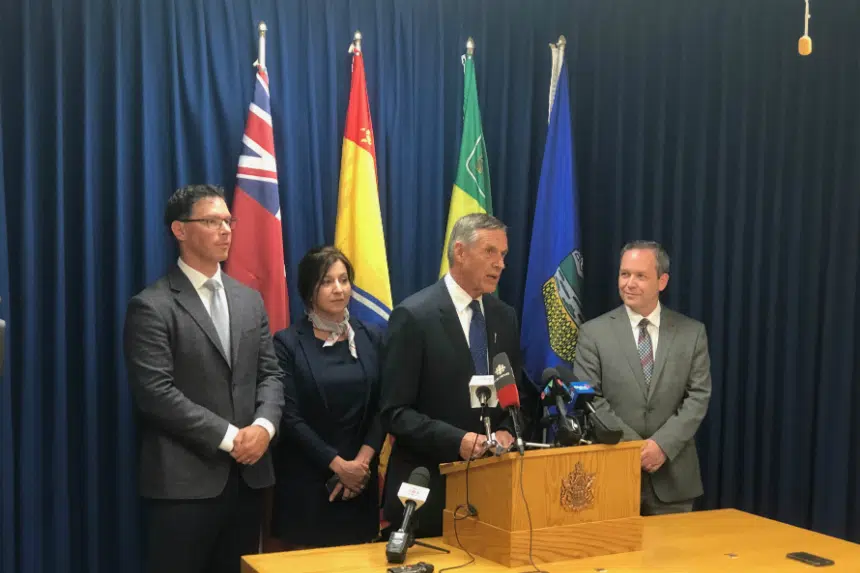The attorneys general of Saskatchewan, Alberta, Ontario and New Brunswick met Tuesday morning in Saskatoon to discuss the Supreme Court challenge of the federal carbon tax.
Saskatchewan’s attorney general, Don Morgan, said this is the first time that he knows of that attorneys general have met to discuss a supreme court challenge in the history of the nation.
Morgan said the meeting “was a good and valuable, and meaningful exchange of ideas and strategies this morning.”
Morgan did admit that climate change is a threat, but the federal carbon tax is still a tax.
“A tax that applies to some provinces and not others is clearly, unconstitutional.”
The meetings surrounding the carbon tax and its appeal don’t have a price tag just yet, but Morgan added that it would likely be in “the hundreds of thousands”.
He said every bit of money that has gone into determining the legalities is worth it.
“The importance of trying to determine federal and provincial (and where the line is drawn), is important enough that we’re more than willing to spend the money to try and get clear resolution and clear answers on where we need to be.”
Morgan said a possible change in government could also mean the tax won’t go ahead.
“We think that we want to be ready in case there isn’t a change. But also, even if there isn’t a change in government we think it’s worthwhile to try and set a precedent that clearly defines where environment falls on the division of powers between federal and provincial governments.”
Alberta’s Doug Schweitzer echoed Morgan’s stance.
“This is emission critical, it’s for the future of our province, and we’re not going to allow the federal Trudeau Liberals to impose on provincial jurisdiction.
“We’re in the process this week of filing our court materials, affidavit evidence, as well as our argument. This is a situation where the province has filled this space responsibly. We don’t need Ottawa and the Trudeau Liberal’s coming in and telling us how to do this. We do it, we do it well, we’re the best in the world at doing it.”
When it comes to the different provinces appealing the tax, the question of doing the appeals together was raised.
Morgan said he will defer to the courts decision, but he doesn’t believe the court will want to make a decision, just to hear one, or multiple similar cases moving forward.
“Our guess is that the Supreme Court will likely direct that (all the appeals) will be heard together. They’ll want to hear all the legal arguments together, and to the extent of the factual arguments.”
Saskatchewan’s Court of Appeal denied the provincial government’s challenge on the federal government’s carbon tax on May 3.
When it comes to Tuesday’s discussion, Morgan said it was a lot of looking into the same arguments they’ve had in the past, but they talked about the nature and legislation of the tax.
“(Just) because something is important, doesn’t necessarily mean it’s a federal issue,” he said. “Greenhouse gases are something that need to be dealt with, but have to be dealt with at a provincial level in collaboration and in conjunction with other provinces.”
Quebec and Manitoba also were contacted about their stance on the federal carbon tax with the attorneys general.
The appeal to the Supreme Court for the federal carbon tax is to be heard tentatively on December 5.
— With files from 980 CJME’s Lisa Schick











